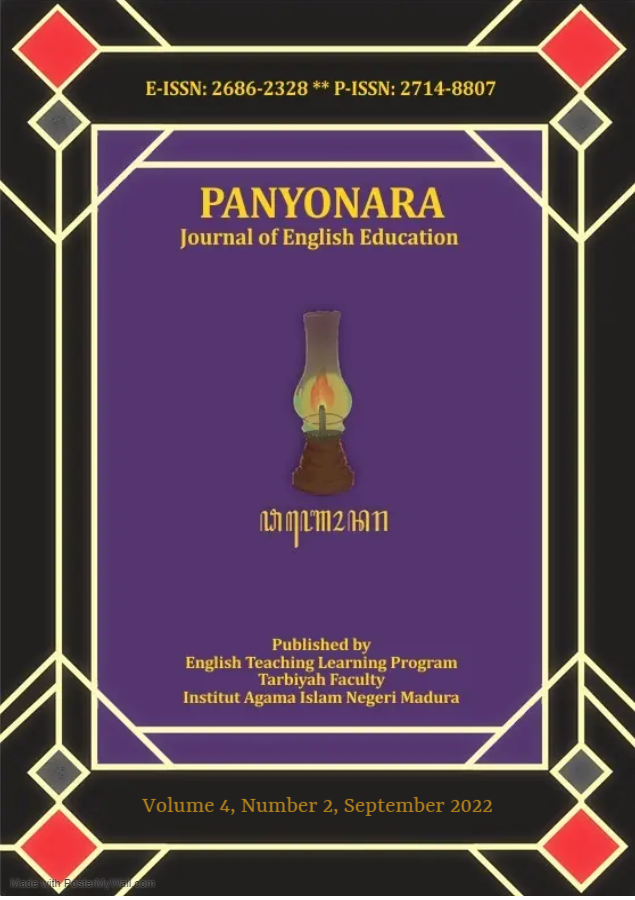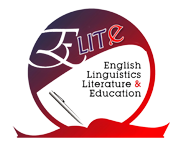An Important Role of Portfolio Assessment in Indonesian EFL Writing Learning Contexts
 Abstract views: 215
,
Abstract views: 215
,
 PDF downloads: 209
PDF downloads: 209
Abstract
Abstract: To intensively solidify Indonesian EFL learners’ writing competencies development, teachers need to constantly internalize portfolio assessment in their daily-based writing teaching-learning dynamics. This current small-scale library study aimed to profoundly investigate an important role of portfolio assessment in Indonesian EFL writing learning contexts. Concerning this major research objectivity, the researcher conscientiously selected 30 prior journal articles overviewing this main theme in this archipelago starting from 2015 until 2021 year to yield more relevant research findings in nowadays second language writing learning contexts. This current small-scale qualitative investigation was conducted in the support of library study approach in order to obtain more robust research findings relevant to the portfolio assessment implemented in Indonesian EFL learning contexts. He obtained research results revealed: (1) The proper utilization of portfolio assessment can arm learners with advanced writing competencies and (2) The continual integration of portfolio assessment can promote more holistic writing learning outcomes. As an eventual remark, it can be inferred that the incorporation of portfolio assessment is critically pivotal not merely for developing Indonesian EFL learners’ writing proficiency to the utmost levels but also for supportive writing behaviors while engaging in varied complex writing learning enterprises
Downloads
References
Aghazadeh, Z., & Soleimani, M. (2020). The Effect of E-Portfolio on EFL Learners’ Writing Accuracy, Fluency, and Complexity. Reading Matrix: An International Online Journal, 20(2), 182–199.
Aprianto, D., & Zaini, N. (2019). The Principles of Language Learning and Teaching in Communication Skill Developments. VELES Voices of English Language Education Society, 3(1), 45–61. https://doi.org/10.29408/veles.v3i1.1281
Ashadi, R. I. (2019). European Journal of English Language Teaching FROM AUTHENTIC TO HOLISTIC : THE EVOLVING TREND OF PORTFOLIO – BASED ASSESSMENT. 32–43. https://doi.org/10.5281/zenodo.3328742
Bataineh, R. F., & Obeiah, S. F. (2016). The effect of scaffolding and portfolio assessment on Jordanian EFL learners’ writing. Indonesian Journal of Applied Linguistics, 6(1), 12-19.
Berliningrum, C., Putrayasa, I. B., Sudiana, I. N., & Sutama, I. (2021). The Effect of Portfolio Assessment on Students’ Writing Competency during Online Learning Period. International Journal of Early Childhood Special Education, 13(2).1160-1163
Crusan, D., Plakans, L., & Gebril, A. (2016). Writing assessment literacy: Surveying second language teachers’ knowledge, beliefs, and practices. Assessing Writing, 28, 43–56. https://doi.org/10.1016/j.asw.2016.03.001
Dahviyanti, W. N. G & Iskandar. (2019). Using portfolio assessment to improve EFL students’ expository-writing performance. International Journal of Humanities and Innovation, 2(1), 1-6. https://doi.org/10.33750/ijhi.v2i1.29
Demirel, M., & Duman, H. (2015). The Use of Portfolio in English Language Teaching and Its Effects on Achievement and Attitude. Procedia - Social and Behavioral Sciences, 191, 2634–2640. https://doi.org/10.1016/j.sbspro.2015.04.598
Efendi, Z., Muslem, B. U. A., & Syiah. (2017). Implementation of Portfolio Assessment in Teaching English. Syiah Kuala University, Banda Aceh, 8(2), 187–198.
Elyza, F. (2018). Portfolio Assessment Impact to the Students’ Paragraph Writing. Visipena, 9(1), 193-202. https://doi.org/10.46244/visipena.v9i1.452
Eridafithri, E. (2015). The Application of Portfolios to Assess Progress in Writing of EFL Students at Secondary Schools in Banda Aceh. Studies in English Language and Education, 2(1), 1. https://doi.org/10.24815/siele.v2i1.2231
Hafiz, H. S., Hakim, M. I., & Harun, M. A. (2021). The Effectiveness of Portofolio Assessment in English Writing Skill of Islamic Junior High School. Journal of Educational Research and Evaluation, 10(1), 28–36. https://doi.org/10.15294/jere.v10i1.48122
Halim, I. A., Hartati, A., & Lestari, Z. W. (2019). the Use of Portfolio Assessment of Writing Skill in Descriptive Text. JALL (Journal of Applied Linguistics and Literacy), 3(2), 75. https://doi.org/10.25157/jall.v3i2.2420
Hasanah, N., & Habibullah, M. (2020). The Analysis of Subject-Verb Agreement Errors on Students’ Writing Descriptive Text. PANYONARA: Journal of English Education, 2(2), 109. https://doi.org/10.19105/panyonara.v2i2.3702
Hudori, R. F. A., Tasnim, Z., Fardhani, A. E., & Sari, D. P. (2020). The Use of Portfolio Assessment in English Writing Classes. IOP Conference Series: Earth and Environmental Science, 485(1), 0–7. https://doi.org/10.1088/1755-1315/485/1/012093
Khodashenas, M. R., & Rakhshi, F. (2017). The Effect of Electronic Portfolio Assessment on the Writing Performance of Iranian EFL Learners. International Journal of Research in English Education, 2(3), 67–77. https://doi.org/10.18869/acadpub.ijree.2.3.67
Lam, R. (2018). Understanding Assessment as Learning in Writing Classrooms: The Case of Portfolio Assessment Iranian Journal of Language Teaching Research. Iranian Journal of Language Teaching Research, 6(3), 19–36. http://ijltr.urmia.ac.ir
Listiana, I., Yusuf, F. N., & Isman, S. M. (2021). Portfolio Assessment: Benefits for Students At Different Writing Proficiency Level. Jurnal Pendidikan Bahasa Dan Sastra, 20(2), 243–256. https://doi.org/10.17509/bs_jpbsp.v20i2.33064
Ma'arif, A. S., Abdullah, F., Fatimah, A. S., & Hidayati, A. N. (2021). Portfolio-based assessment in English language learning: highlighting the students’ perceptions. J-SHMIC: Journal of English for Academic, 8(1), 1-11. https://doi.org/10.25299/jshmic.2021.vol8(1).6327
Mawiliana, P. (2021). The Use of Portfolio to Assess Studentsâ€TM Learning Autonomy in Enhancing Their Writing Skill: The Case of MA Madarijul Huda. English Education Journal, 11(1), 123–129. https://doi.org/10.15294/eej.v11i1.42207
Mohamadi, Z. (2018). Comparative effect of online summative and formative assessment on EFL student writing ability. Studies in Educational Evaluation, 59(July 2017), 29–40. https://doi.org/10.1016/j.stueduc.2018.02.003
Mukhsinah, A. F. (2020). The Use of E-portfolio Assessment To Improve Students' Writing Ability. RETAIN, 8(2). 164-170.
Nassirdoost, P., & Mall-Amiri, B. (2015). The Impact of Portfolio Assessment on EFL Learners’ Vocabulary Achievement and Motivation. Journal for the Study of English Linguistics, 3(1), 38. https://doi.org/10.5296/jsel.v3i1.7750
Nopita, D. (2018). The Influence of Portfolio Assessment in Improving the Quality of Teaching English Foreign Language (EFL) Writing. 174(Ice 2017), 415–418. https://doi.org/10.2991/ice-17.2018.88
Nur Gita Dahviyanti, W. (2019). Using portfolio assessment to improve EFL students’ expository-writing performance. International Journal of Humanities and Innovation (IJHI), 2(1), 1–12. https://doi.org/10.33750/ijhi.v2i1.29
Nosratinia, M., & Abdi, F. (2017). The comparative effect of portfolio and summative assessments on EFL learners’ writing ability, anxiety, and autonomy. Journal of Language Teaching and Research, 8(4), 823-834.
Obeid, R. (2017). Second Language Writing and Assessment: Voices from Within the Saudi EFL Context. English Language Teaching, 10(6), 174. https://doi.org/10.5539/elt.v10n6p174
Pakasi, J. H., & Beal, J. (2019). Portfolio Assessment for an Undergraduate Intermediate Level Writing Class. Edusentris, 5(2), 91. https://doi.org/10.17509/edusentris.v5i2.297
Pourdana, N. (2021). Exploring the Effects of Genre-based Portfolio Assessment on EFL Writing With Focus on Learner Engagement. 1–26. https://www.researchsquare.com/article/rs-482242/latest.pdf
Raihany, A. (2014). The Importance of Teacher’s Written Feedback on the Students’ Writing in Teaching Learning Process. OKARA Journal of Languages and Literature, 1(9), 91–106.
Rukmini, D., & Saputri, L. A. D. E. (2017). The authentic assessment to measure students’ English productive skills based on 2013 Curriculum. Indonesian Journal of Applied Linguistics, 7(2), 263–273. https://doi.org/10.17509/ijal.v7i2.8128
Saharuddin, S. (2019). The Implementation of Portfolio Assessment in Teaching Writing (Doctoral dissertation, Universitas Negeri Makassar).
Segaran, M. K., & Hasim, Z. (2021). Malaysian journal of learning self-regulated learning through e-portfolio : A Meerita Kunna Segaran & 2 Zuwati Hasim. 1(1), 131–156.
Setiawan, A., & Mulyadi, D. (2021). The Portfolio Assessment to Teach Writing of Opinion Essay. Language Circle: Journal of Language and Literature, 15(2), 329–336. https://doi.org/10.15294/lc.v15i2.28807
Setyowati, L., Sukmawan, S., & El-Sulukiyyah, A. A. (2020). Exploring the use of esl composition profile for college writing in the Indonesian context. International Journal of Language Education, 4(2), 171–182. https://doi.org/10.26858/ijole.v4i2.13662
Sinar, T. S., Putri, L. A., & Putri, D. M. (2020). Incorporating Self-assessment and Reflection in Writing Portfolios of EFL Writers. Icosteerr 2018, 1273–1279. https://doi.org/10.5220/0010071412731279
Suherman, A. (2018). Examining students’ perceptions of using portfolio as an assessment tool in an EFL writing classroom. In Proceedings of International Conference on English Language Teaching (INACELT) (Vol. 2, No. 1, pp. 65-70).
Sulistyo, T., Eltris, K. P. N., Mafulah, S., Budianto, S., Saiful, S., & Heriyawati, D. F. (2020). Portfolio assessment: Learning outcomes and students’ attitudes. Studies in English Language and Education, 7(1), 141–153. https://doi.org/10.24815/siele.v7i1.15169
Sumarno, W. K., & Tatik, T. (2018). Integrating Edmodo-Based Digital Portfolio With Efl Writing Instruction: Exploring the Students’ Perceptions. Journal of English Education, 3(2), 100–106. https://doi.org/10.31327/jee.v3i2.864
Taufik, M., & Cahyono, B. Y. (2020). Developing EFL Students’ Writing Skill Through Self-Assessment Integrated With E-Portfolio. IJEE (Indonesian Journal of English Education), 6(2), 171–186. https://doi.org/10.15408/ijee.v6i2.12019
Tyas, P. A. (2020). Promoting Students’ Autonomous Learning Using Portfolio Assessment in EFL Writing Class. JEES (Journal of English Educators Society), 5(1), 75–81. https://doi.org/10.21070/jees.v5i1.379
Utama, T. P. (2020). Portfolio System in Teaching Writing: EFL Students’ Perceptions. Pedagogy : Journal of English Language Teaching, 8(2), 159. https://doi.org/10.32332/pedagogy.v8i2.2262
Utama, T. P., Sumardi, S., & Supriyadi, S. (2019). An Implementation of Portfolio System in Writing Class : Middle Education Teachers ’ Experience. 403–411.
Virgin, J. A., & Bharati, Dwi Anggani, L. (2020). Teachers’ perception, plan, and implementation of portfolio assessment in students’ writing assessment. English Education Journal, 10(2), 143–153.
Warni, S. (2017). Facilitating an implementation of Online Portfolios in an EFL Writing Class. Journal of ELT Research: The Academic Journal of Studies in English Language Teaching and Learning, 24-36.
Wijaya, K. F. (2022). English Education Master Students’ Perceptions on Peer Feedback in Academic Writing. Journal of Foreign Language Teaching and Learning, 7(1), 117–137. https://doi.org/10.18196/ftl.v7i1.12751
Wijaya, K. F. (2022). Exploring English Education Master Students’ Metacognitive Awareness in Academic Writing Learning Enterprises. ELTR Journal, 6(1). 11-25. https://doi.org/10.37147/eltr.v6i1.120
Wulandari, A. T., Pratolo, B. W., & Junianti, R. (2019). Lecturersâ€TM Perceptions on Portfolio As an Assessment Tool in English Language Testing. Leksema: Jurnal Bahasa Dan Sastra, 4(2), 179–190. https://doi.org/10.22515/ljbs.v4i2.1988
Yulianawati, I., Saleh, M., Mujiyanto, J., & Sutopo, D. (2022). The Effectiveness of Writing Techniques in Improving Students’ Writing Ability with Different Self-Esteem. Studies in English Language and Education, 9(1), 30–44. https://doi.org/10.24815/siele.v9i1.21725
The journal uses an Open Access policy under a Creative Commons Attribution-NonCommercial 4.0 International License. Authors who publish with this journal agree to the following terms:
- Authors retain copyright and grant the journal right of first publication with the work simultaneously licensed under a Creative Commons Attribution License that allows others to share the work with an acknowledgment of the work's authorship and initial publication in this journal.
- Authors are able to enter into separate, additional contractual arrangements for the non-exclusive distribution of the journal's published version of the work (e.g., post it to an institutional repository or publish it in a book), with an acknowledgment of its initial publication in this journal.
- Authors are permitted and encouraged to post their work online (e.g., in institutional repositories or on their website) prior to and during the submission process, as it can lead to productive exchanges, as well as earlier and greater citation of published work.
















